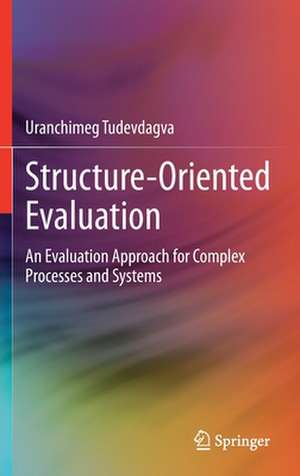Structure-Oriented Evaluation: An Evaluation Approach for Complex Processes and Systems
Autor Uranchimeg Tudevdagvaen Limba Engleză Hardback – 12 iun 2020
| Toate formatele și edițiile | Preț | Express |
|---|---|---|
| Paperback (1) | 443.58 lei 43-57 zile | |
| Springer International Publishing – 12 iun 2021 | 443.58 lei 43-57 zile | |
| Hardback (1) | 524.22 lei 43-57 zile | |
| Springer International Publishing – 12 iun 2020 | 524.22 lei 43-57 zile |
Preț: 524.22 lei
Preț vechi: 616.74 lei
-15% Nou
Puncte Express: 786
Preț estimativ în valută:
100.31€ • 105.01$ • 82.100£
100.31€ • 105.01$ • 82.100£
Carte tipărită la comandă
Livrare economică 07-21 aprilie
Preluare comenzi: 021 569.72.76
Specificații
ISBN-13: 9783030448059
ISBN-10: 3030448053
Pagini: 92
Ilustrații: XII, 92 p. 57 illus., 27 illus. in color.
Dimensiuni: 155 x 235 mm
Greutate: 0.33 kg
Ediția:1st ed. 2020
Editura: Springer International Publishing
Colecția Springer
Locul publicării:Cham, Switzerland
ISBN-10: 3030448053
Pagini: 92
Ilustrații: XII, 92 p. 57 illus., 27 illus. in color.
Dimensiuni: 155 x 235 mm
Greutate: 0.33 kg
Ediția:1st ed. 2020
Editura: Springer International Publishing
Colecția Springer
Locul publicării:Cham, Switzerland
Cuprins
Introduction.- Evaluation approaches for complex systems.- Theoretical foundation of structure oriented evaluation.- Early examples with e-learning.- Examples for complex systems with simulated data.- Guideline for use of structure oriented evaluation model.
Notă biografică
Uranchimeg Tudevdagva was born in 1969, graduate of Novosibirsk State Technical University and Mongolian University of Science and Technology, holds doctorates from Novosibirsk State Technical University and Technische Universität Chemnitz.
Textul de pe ultima copertă
This book introduces a new branch of evaluation theory, where evaluation and score calculation are embedded into general measure theory, as is typical in geometry, probability theory and reliability theory. The author describes the theoretical background of new evaluation model for complex processes, where interests of involved groups are considered as multi-players of evaluation process. Readers will learn how the logical structure of a process/system can be included into an evaluation. The author applies these techniques not only to the visualization of evaluation goals, but also the designed logical structure becomes the basis for calculation of evaluation scores. Various examples are provides to demonstrate the implementation of the methods.
- Introduces a new branch of evaluation theory;
- Shows how the logical structure of a process/system can be included into an evaluation;
- Offers readers advantage over linear evaluation methods, since no weight factors are needed.
Caracteristici
Introduces a new branch of evaluation theory Shows how the logical structure of a process/system can be included into an evaluation Offers readers advantage over linear evaluation methods, since no weight factors are needed
